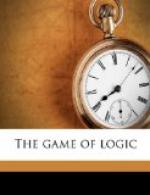In the first case, you may say “the Premisses are fallacious”: in the second, “the conclusion is fallacious.”
The chief use you will find, in such Logical skill as this Game may teach you, will be in detecting ‘fallacies’ of these two kinds.
The first kind of Fallacy—’Fallacious Premisses’—you will detect when, after marking them on the larger Diagram, you try to transfer the marks to the smaller. You will take its four compartments, one by one, and ask, for each in turn, “What mark can I place here?”; and in every one the answer will be “No information!”, showing that there is no conclusion at all. For instance,
“All soldiers are brave;
Some Englishmen are brave.
&there4 Some Englishmen are soldiers.”
looks uncommonly like a Syllogism, and might easily take in a less experienced Logician. But you are not to be caught by such a trick! You would simply set out the Premisses, and would then calmly remark “Fallacious Premisses!”: you wouldn’t condescend to ask what conclusion the writer professed to draw—knowing that, whatever it is, it must be wrong. You would be just as safe as that wise mother was, who said “Mary, just go up to the nursery, and see what Baby’s doing, and tell him not to do it!”
The other kind of Fallacy—’Fallacious Conclusion’—you will not detect till you have marked both Diagrams, and have read off the correct Conclusion, and have compared it with the Conclusion which the writer has drawn.
But mind, you mustn’t say “Fallacious Conclusion,” simply because it is not identical with the correct one: it may be a part of the correct Conclusion, and so be quite correct, as far as it goes. In this case you would merely remark, with a pitying smile, “Defective Conclusion!” Suppose, of example, you were to meet with this Syllogism:—
“All unselfish people
are generous;
No misers are generous.
&there4 No misers are unselfish.”
the Premisses of which might be thus expressed in letters:—
“All x’
are m;
No y are m.”
Here the correct Conclusion would be “All x’ are y’” (that is, “All unselfish people are not misers"), while the Conclusion, drawn by the writer, is “No y are x’,” (which is the same as “No x’ are y,” and so is part of “All x’ are y’.”) Here you would simply say “Defective Conclusion!” The same thing would happen, if you were in a confectioner’s shop, and if a little boy were to come in, put down twopence, and march off triumphantly with a single penny-bun. You would shake your head mournfully, and would remark “Defective Conclusion! Poor little chap!” And perhaps you would ask the young lady behind the counter whether she would let you eat the bun, which the little boy had paid for and left behind him: and perhaps she would reply “Sha’n’t!”




